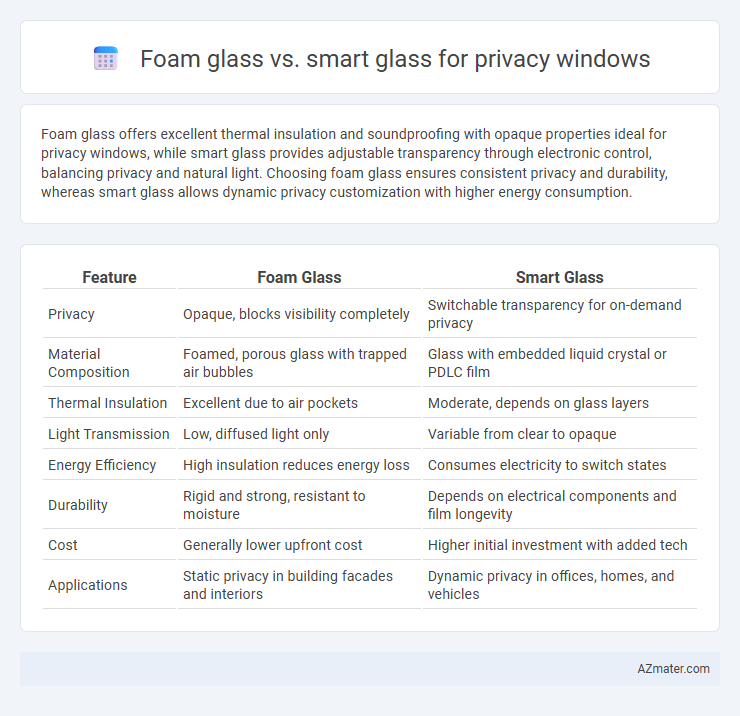Foam glass offers excellent thermal insulation and soundproofing with opaque properties ideal for privacy windows, while smart glass provides adjustable transparency through electronic control, balancing privacy and natural light. Choosing foam glass ensures consistent privacy and durability, whereas smart glass allows dynamic privacy customization with higher energy consumption.
Table of Comparison
| Feature | Foam Glass | Smart Glass |
|---|---|---|
| Privacy | Opaque, blocks visibility completely | Switchable transparency for on-demand privacy |
| Material Composition | Foamed, porous glass with trapped air bubbles | Glass with embedded liquid crystal or PDLC film |
| Thermal Insulation | Excellent due to air pockets | Moderate, depends on glass layers |
| Light Transmission | Low, diffused light only | Variable from clear to opaque |
| Energy Efficiency | High insulation reduces energy loss | Consumes electricity to switch states |
| Durability | Rigid and strong, resistant to moisture | Depends on electrical components and film longevity |
| Cost | Generally lower upfront cost | Higher initial investment with added tech |
| Applications | Static privacy in building facades and interiors | Dynamic privacy in offices, homes, and vehicles |
Introduction to Privacy Windows
Privacy windows enhance indoor comfort by controlling visibility and light transmission, utilizing materials like foam glass and smart glass for different applications. Foam glass offers excellent insulation and opacity, making it ideal for static privacy needs in residential or commercial buildings. Smart glass provides dynamic transparency control using electrochromic technology, allowing users to adjust privacy levels on demand while maintaining natural light flow.
What is Foam Glass?
Foam glass is a lightweight, insulating material made from crushed glass fused into a cellular structure, providing excellent thermal insulation and soundproofing properties for privacy windows. Unlike smart glass, which changes opacity through electrical stimuli, foam glass offers passive privacy and durability without requiring power or maintenance. Its closed-cell structure also makes it moisture-resistant and fireproof, ideal for static privacy solutions in residential and commercial buildings.
What is Smart Glass?
Smart glass, also known as switchable glass, uses electrochromic, photochromic, or thermochromic technology to alter its opacity and control light transmission for enhanced privacy and energy efficiency. Unlike foam glass, which is a solid insulating material, smart glass can instantly change from transparent to opaque with the flip of a switch, providing dynamic privacy options for windows. This technology is widely used in offices, homes, and commercial buildings to ensure privacy without sacrificing natural light.
Privacy Mechanisms: Foam Glass vs Smart Glass
Foam glass provides privacy primarily through its opaque, cellular structure that diffuses light and blocks visibility, ensuring a high level of visual obstruction without transparency. Smart glass utilizes electrochromic or liquid crystal technology to dynamically switch between transparent, translucent, or opaque states, allowing customizable privacy control with the flick of a switch. While foam glass offers permanent privacy with excellent thermal insulation, smart glass delivers adaptable privacy solutions suitable for modern, multifunctional spaces.
Energy Efficiency Comparison
Foam glass offers excellent thermal insulation due to its closed-cell structure, significantly reducing heat transfer and contributing to lower energy consumption in buildings. Smart glass, while providing dynamic light control through electrochromic technology, can optimize energy efficiency by adjusting transparency to reduce cooling and heating loads. Comparing both, foam glass excels in passive insulation with stable performance, whereas smart glass enhances energy savings through active modulation of solar heat gain.
Installation and Maintenance Differences
Foam glass offers easy installation with lightweight, rigid panels that can be cut to size and affixed directly to window frames, requiring minimal maintenance due to its durable, non-porous surface resistant to mold and moisture. Smart glass installation typically involves integrating electronic components, such as wiring and control systems, making the process more complex and time-consuming compared to foam glass. Maintenance for smart glass includes periodic checks of electrical components and potential replacement of parts, whereas foam glass requires only simple cleaning without the risk of electronic failures.
Customization and Design Flexibility
Foam glass offers excellent insulation but limited customization options for privacy windows, typically available in standard shapes and thicknesses. Smart glass provides superior design flexibility, enabling dynamic control over opacity and transparency through electronic activation, which allows personalized privacy levels and aesthetic versatility. Customization in smart glass extends to a variety of tint colors, patterns, and integration with smart home systems, making it ideal for modern, adaptable window designs.
Cost Analysis: Foam Glass vs Smart Glass
Foam glass provides a cost-effective solution for privacy windows with low installation and maintenance expenses, making it ideal for budget-conscious projects. Smart glass, while offering advanced privacy control and adjustable transparency, incurs higher upfront costs and requires specialized installation and maintenance. Analyzing lifecycle costs, foam glass tends to have lower total expenses compared to smart glass, which may offset its higher initial investment through energy savings and enhanced functionality.
Durability and Longevity
Foam glass is highly durable due to its rigid cellular structure, providing excellent resistance to moisture, chemicals, and physical impacts, making it ideal for long-term privacy window installations. Smart glass, while offering dynamic light control for privacy, relies on electronic components that may degrade over time and require maintenance or replacement, impacting its overall longevity. For sustained durability and lifespan, foam glass presents a more robust option compared to the technologically complex smart glass.
Which Privacy Window Solution Is Best?
Foam glass offers excellent thermal insulation and soundproofing properties, making it a durable choice for privacy windows in both residential and commercial settings. Smart glass provides dynamic privacy control by switching from transparent to opaque with an electric signal, allowing customizable privacy on demand. Choosing the best privacy window solution depends on whether permanent insulation and privacy or flexible, instant privacy control is the priority for your space.

Infographic: Foam glass vs Smart glass for Privacy window
 azmater.com
azmater.com